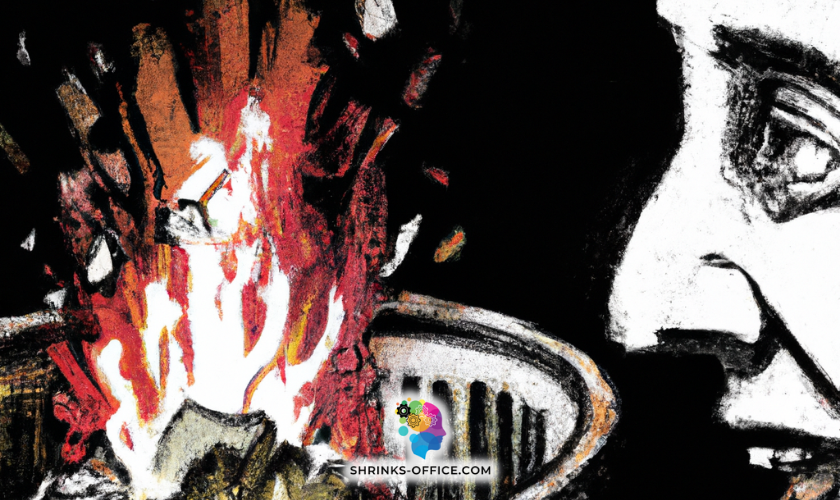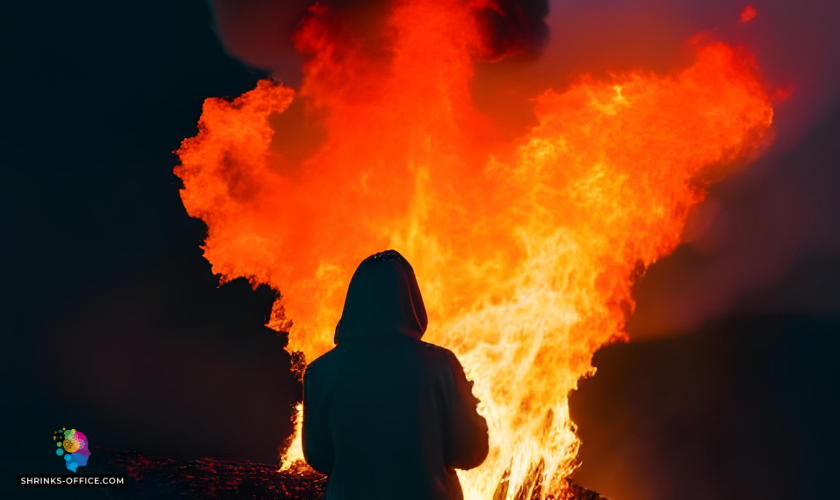Pyromania: Understanding the Causes and Symptoms of This Rare Disorder
Pyromania is a rare impulse control disorder characterized by an irresistible urge to deliberately start fires, coupled with a fascination or attraction to fire and its effects. Individuals with pyromania experience a sense of tension or emotional arousal before setting a fire and subsequent relief or gratification after the act.
Unlike arson, pyromania is not motivated by financial gain, ideological beliefs, or a desire to harm others. Instead, the act of setting fires serves as a way to satisfy the individual's pathological urge.
- Biological factors
- Psychological factors
- Environmental factors
- Social factors
- Cognitive factors
- Recurrent, intense urges to set fires.
- Pleasure, gratification or relief when setting fires.
- Tension, excitement or arousal before setting fires.
- Fascination with, interest in or attraction to fire and its effects.
- Difficulty controlling the impulse to set fires.
- Deliberately setting fires in public or private places.
- Starting fires to gain attention, revenge, or to express anger.
- Feeling a sense of anticipation or longing for the next fire.
- Ignoring the risks or consequences of setting fires.
- Distress or impairment in social, occupational, or other areas of functioning as a result of the behavior.
- Cognitive-behavioral therapy (CBT)
- Medication
- Lifestyle changes
- Family therapy
- Support groups
- Early intervention
- Mental health support
- Parents should closely monitor their children's behavior and be aware of any signs of fascination with fire or setting fires
- Fire safety education
- Learning healthy ways to manage stress and emotions
- Individuals who are at risk of pyromania should avoid triggers
- Encouraging the development of positive coping mechanisms such as exercise, art, or music can help individuals
Pyromania is an impulse control disorder that is characterized by the urge to start fires. Individuals with pyromania experience intense fascination with fire-setting, and they often derive pleasure or emotional release from lighting fires. Pyromania is a rare mental disorder, with less than 1% of the general population affected by it [1]. However, it is a serious mental illness that requires attention from mental health professionals.
Helpful tip
Seeking therapy can provide valuable support and guidance for individuals struggling with pyromania. Therapy offers a safe space to explore underlying causes, develop coping strategies, and ultimately experience the benefits of therapy in managing and overcoming pyromaniac behaviors.
What Causes Pyromania?

The exact cause of pyromania is not known, but research suggests that it may be linked to a genetic component or brain chemicals that impair judgment and control impulses [2].
Other risk factors for developing pyromania include;
- having a family history of the disorder
- learning disabilities
- other mental illnesses such as mood disorder, antisocial personality disorder, intermittent explosive disorder, or conduct disorders
Some individuals may also develop pyromania as a result of substance abuse or other impulse control disorders.
Pyromania Symptoms
People with pyromania exhibit fire-setting behaviors that are purposeful and not for monetary gain, revenge, or expression of anger. American Psychiatric Association states that somebody with pyromania may set fires as often as every six weeks [3]. The Diagnostic and Statistical Manual (DSM-5) sets out the diagnostic criteria for pyromania diagnosis [3]. Clinical characteristics of pyromania include:
- A fascination with fire-setting
- A compulsion to set fires
- A sense of pleasure or emotional release from setting fires
- Experiencing negative consequences as a result of setting fires
- An inability to control impulses related to setting fires
People with pyromania may also exhibit violent behavior, such as starting fires in public places or watching fires without regard for the safety of others.
According to current studies, a person with pyromania often gains a sense of emotional release after setting a fire. Yet afterward, they may experience feelings of guilt or distress due to the fact that possibly their attempts at controlling the urge were unsuccessful [4].
It is important to note that fire-setting alone does not necessarily mean pyromania. This behavior could also be indicative of a range of mental disorders, including:
- Uncontrolled impulse disorders such as pathological gambling
- mood or affective disorders like depression and bipolar disorder
- conduct disorder
- substance use or addiction
How to Treat Pyromania?

Without proper care and attention, pyromania can become a long-term issue. That's why it is essential to take action immediately when signs of the condition appear. Fortunately, this disorder may go into remission with the assistance of various therapy techniques. However, no single approach works for everyone. When considering treatment options, remember that it might take time to find what type (or combination) best suits you. Potential treatments include:
- Cognitive-behavioral therapy - Cognitive behavioral therapy has yielded remarkably positive results for those wishing to manage their impulses and triggers [4]. It helps to break the chain of thoughts that lead to impulsive pyromania behaviors.
- Medications - In order to diminish the temptation to set fires, physicians may prescribe medications such as antidepressants, anxiolytics (antianxiety drugs), antiepileptic medications, or antipsychotics.
- Group therapy - Some mental health professionals believe that working in a group setting may be beneficial for those with pyromania. Group therapy offers an opportunity to connect with those facing similar struggles and gain insight from collective wisdom.
In addition, family counseling may help address underlying issues related to the disorder. Treatment may also involve addressing comorbid mental health conditions such as mood disorders or substance use disorders for some individuals. In cases where a diagnosis of pyromania or fire-setting is given to a child, joint therapy and/or parental guidance may be necessary.
Pyromania vs. Arson
Pyromania is an impulse control disorder and is distinct from arson, which is a criminal act. It should be noted that not all fire setters have pyromania. In some cases, criminal behavior is intentional and driven by malicious intent.
While pyromania and arson both involve intentional fire-starting, the former is a pathological trait while the latter may not. Most arsonists don't have pyromania; however, they could suffer from another mental health issue or be socially isolated.
Helpful tip
If you're seeking help for pyromania, consider online therapy that takes insurance. It provides accessible and affordable mental health support for managing and addressing pyromaniac tendencies.
Preventing Pyromania
Preventing pyromania involves early detection and intervention, as well as education and awareness programs. Individuals with a family history of the disorder or those who exhibit fire-setting behaviors should seek professional help from a mental health expert. Taking proactive fire safety measures, like installing smoke detectors and keeping combustible materials away from ignition sources, can help guard against fires caused by accidents.

Personal Stories Of Those With Pyromania
Arya Bhatt
In her childhood, Arya developed a fascination with fire and began experimenting with lighting matches and playing with fire-related materials like cotton wicks. Growing up in a Hindu household, where fire was an integral part of religious rituals, further fueled her interest in flames. Although she refers to herself as a pyromaniac, she clarifies that her attraction to fire stemmed from artistic appreciation and a sense of beauty, rather than from sadistic tendencies or emotional distress.
Arya shares an incident from her childhood when she almost caused a fire in her house by lighting a cotton ball. Although the incident did not result in any significant damage, it made her realize the potential dangers associated with fire. Despite her continued fascination, she exercised caution and supervision when burning paper to create aged documents, using an electric stove to control the process. Arya acknowledges the influence of her aunt's cooking accident, which left her scarred from severe burns, as a reminder of the destructive power of fire.
During her teenage years, the author's love for fire extended to campfires, which became a regular family activity. One night, she inadvertently left a fire smoldering in the backyard, realizing the potential disaster it could have caused had it spread. This experience marked a turning point for her, leading her to cease burning things and reflect on the consequences of her past actions. As an adult, she appreciates the lessons learned from her pyromania, understanding the importance of responsibility and the potential harm she could have caused her loved ones. She now channels her fascination with fire into enjoying the ambiance of fragrant candles.
Michael B. Jordan
In an episode of "First We Feast," 31-year-old actor Michael B. Jordan, known for his roles in "Black Panther" and "Fantastic Four," revealed his childhood fascination with fire. Growing up next door to his grandmother, Jordan would light matches and set her incense on fire for the thrill of it. Not stopping at that, he would even poke the burning incense through the plastic shower curtains.
However, Jordan's mischievous behavior did not go unnoticed by his grandmother, who swiftly disciplined him for his pyromaniac tendencies. Reflecting on those times, Jordan fondly shared that he received his fair share of "whoopings" as a consequence. Additionally, the actor confessed to taking his parents' car for joyrides in Jersey City, citing the "Fast and the Furious" franchise as his inspiration for those adventures.
Watch Michael B. Jordan's story.
Conclusion
Pyromania is an extremely dangerous mental illness that can cause extensive property damage, injury, or even death. It's important to be aware of the warning signs of pyromania and immediately reach out for specialized help from an online therapist.
To effectively counteract this disorder, it is essential to recognize the root causes and risk factors associated with it so as to prevent further development. With proper assessment and treatment plans in place, those struggling with pyromania are able to learn how to manage their impulses better and lead healthier lives.
FAQ
Can pyromania be caused by trauma?
Yes, trauma can be a contributing factor to the development of pyromania. People who have endured hardship may turn to set fires to deal with their inner turmoil. It is essential that they receive professional help and treatment in order to manage the disorder effectively. With guidance from a mental health specialist, pyromania disorder can be managed successfully, and its symptoms alleviated significantly.
Who is most at risk for pyromania?
Anyone can be susceptible to pyromania, but it is most commonly seen in adolescents and young adults [1]. Additionally, those with mental health conditions such as bipolar disorder or attention deficit hyperactivity disorder (ADHD) may be more likely to develop the condition. Moreover, individuals with a family history of mental illness could also face an elevated risk.
References
- Pyromania - an overview | ScienceDirect Topics
- Genetics of impulsive behavior - PMC
- Fire Setting and the Impulse-Control Disorder of Pyromania | American Journal of Psychiatry Residents' Journal
- Firesetting, Arson, Pyromania, and the Forensic Mental Health Expert
- Medium: I Almost Burned My House Down Twice with My Pyromania
- Page Six: Michael B. Jordan is a recovering pyromaniac
